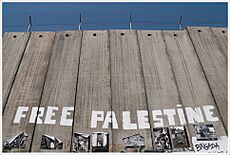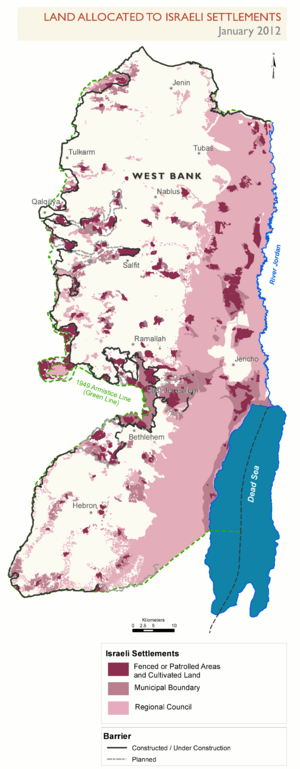United Nations Security Council Resolution 2334 facts for kids
Quick facts for kids UN Security CouncilResolution 2334 |
||
|---|---|---|

Border wall in Palestine
|
||
| Date | 23 December 2016 | |
| Meeting no. | 7853 | |
| Code | S/RES/2334 (Document) | |
| Subject | The situation in the Middle East | |
|
Voting summary
|
|
|
| Result | Adopted | |
| Security Council composition | ||
|
Permanent members
|
||
|
Non-permanent members
|
||
|
||
United Nations Security Council Resolution 2334 is an important decision made by the United Nations Security Council (UNSC) on December 23, 2016. It focuses on Israeli communities, called Israeli settlements, built in Palestinian territories that Israel has occupied since 1967, including East Jerusalem.
The resolution passed with 14 votes in favor and no votes against. The United States chose to abstain, meaning they did not vote for or against it. Other powerful countries like China, France, Russia, and the United Kingdom voted for the resolution. This resolution states that Israel's building of settlements goes against international law and has "no legal validity." It also asks Israel to stop this activity and follow its duties as an occupying power under the Fourth Geneva Convention.
This was the first time the UNSC passed a resolution about Israel and the Palestinian territories since 2009. It was also the first time they specifically talked about Israeli settlements since 1980. Even though the resolution did not include punishments, many people around the world welcomed it. They saw it as a way to support a peaceful solution where both sides negotiate.
Contents
What are Israeli Settlements?
Israeli settlements are communities where Jewish Israeli civilians live. These communities are built on Palestinian lands that Israel has controlled since the Six-Day War in 1967. Resolution 2334 specifically talks about settlements in the West Bank and East Jerusalem.
Many countries believe these settlements are against international law. The Fourth Geneva Convention says it's illegal for a country to move its own people into lands it has taken during a war. Israel, however, says these lands are not "occupied" but "disputed." They argue that no country officially owned the West Bank or Gaza Strip before 1967. But the International Court of Justice disagreed with this argument in 2004.
The UN Security Council has discussed Israeli settlements before, in resolutions like Resolution 446 and Resolution 465. They also supported a plan for peace called the Road map for peace, which asked for a stop to settlement growth.
Main Points of the Resolution
The resolution says that any actions that change the population or status of Palestinian lands occupied by Israel are against international law. This includes building new settlements, expanding existing ones, moving Israeli settlers, taking land, tearing down homes, and moving Palestinian civilians. These actions go against international humanitarian law and Israel's duties as an occupying power.
The resolution also speaks out against all violence against civilians, including terrorism. It supports the idea of a two-state solution, where Israel and a Palestinian state can live peacefully side-by-side. The document also makes it clear that the UN Security Council will not accept any changes to the borders from June 4, 1967, unless both sides agree through talks. It also asks all countries to treat Israel and the occupied territories differently in their dealings.
How the Resolution Passed
Egypt first suggested the resolution, using a document prepared by British and Palestinian legal experts. On December 22, 2016, the US President-elect Donald Trump asked Egypt's president to withdraw the proposal, and Egypt did.
However, on December 23, Malaysia, New Zealand, Senegal, and Venezuela brought the draft resolution back. Israel tried to pressure New Zealand to withdraw its support. Israel's Prime Minister Benyamin Netanyahu even told New Zealand's Foreign Minister that supporting the resolution would be like a "declaration of war." But Britain encouraged New Zealand to continue pushing for a vote.
The resolution passed with 14 votes in favor. The United States was the only country to abstain. The US ambassador, Samantha Power, explained that while the UN often unfairly targets Israel, the resolution also showed the reality on the ground. She said that settlement activity had become "so much worse" that it threatened the chance for a two-state solution.
Reactions to the Resolution
Many countries and groups reacted to the resolution.
Israel's Reaction
The resolution caused a lot of debate in Israel because it criticized the Israeli government. Israel recalled its ambassadors from New Zealand and Senegal. Prime Minister Netanyahu said that countries acting against Israel's interests would face diplomatic and economic consequences. Israel also canceled aid programs to Senegal and visits from officials from Senegal and New Zealand.
Netanyahu said the resolution was part of an "old world that is biased against Israel." He questioned why the Security Council focused on this issue when there were wars in Syria and Sudan. The Israeli opposition leader, Isaac Herzog, said Netanyahu was "declaring war... on the world."
Israel's ambassador, Danny Danon, criticized the countries that approved the resolution. A spokesperson for Netanyahu said that US President Barack Obama was secretly behind the resolution. However, New Zealand's ambassador denied this. The Israeli government announced it would not follow the resolution's terms. They also worried that the resolution's call to distinguish between Israel and the occupied territories would encourage the Boycott, Divestment and Sanctions movement.
Palestine's Reaction
Palestinian President Mahmoud Abbas said the resolution "defined" the Palestinian issue. He added that "the world said its word that settlement in the Palestinian territories occupied in 1967, including East Jerusalem, is illegal." He asked Israel to negotiate to resolve all issues. He also said that if Israel accepted a Palestinian state, 57 Arab and Islamic countries would recognize Israel.
Chief Palestinian negotiator Saeb Erekat called it "a day of victory for international law." He said the international community told Israel that peace would come through ending the occupation and creating a Palestinian state next to Israel.
Reactions from Security Council Countries
- China: Welcomed the resolution, saying it showed what the international community wanted.
- France: Called it an "important and historic event," saying the Security Council clearly stated that settlements hurt the two-state solution.
- Malaysia: Prime Minister Najib Razak called it "a victory to the people of Palestine."
- New Zealand: Foreign Minister Murray McCully said their position was consistent with their long-standing policy on the Palestinian issue.
- Russia: Voted for it because it reflected the international view that Israeli settlements are illegal. They believe a two-state solution needs direct talks.
- Senegal: Stated that it supported a fair solution to the Palestinian-Israeli conflict.
- Spain: Welcomed the resolution, noting that Spain always considered settlements illegal.
- United Kingdom: Welcomed the resolution, saying it supported a two-state solution. They said settlement growth was "corroding the possibility" of peace.
- United States: Secretary of State John Kerry said the US could not "stand in the way of a resolution" that aimed for peace. He said the resolution "rightly condemns violence and incitement and settlement activity."
- Venezuela: Called the resolution's passage historic.
- Ukraine: Compared Israeli settlement of the West Bank to Russia's occupation of Crimea.
Reactions from Other Countries
- Australia: Supported Israel's position, implying they would have voted against the resolution.
- Belgium: Welcomed the resolution, stating that Israeli settlement policy is illegal and hurts the chance for a two-state solution.
- Germany: Welcomed the resolution, saying it confirmed Germany's view that settlements are an obstacle to peace.
- Norway: Welcomed the resolution and said Israel must follow it because settlements are against international law.
- Sweden: Welcomed the resolution, saying it confirmed the EU's and Sweden's position on Israeli settlements.
- Turkey: Welcomed the vote and urged Israel to follow the decision and stop all settlement activities.
Reactions from Other Groups
- Amnesty International: Called the resolution a "welcome step" and said it was important for Israel to stop settlement activities, which they called a "flagrant violation of international humanitarian law."
- Human Rights Watch: Praised the resolution and asked the international community to continue speaking out against illegal Israeli actions.
Effects of the Resolution
The resolution has some important effects, especially for the settlements and for diplomacy.
For the Settlements
In the short term, the resolution might not change much for settlement activities. The Fourth Geneva Convention already says that moving populations into occupied territories is illegal. Also, the resolution does not include any direct punishments.
However, in the longer term, the resolution could affect how the International Criminal Court in The Hague handles lawsuits against Israel. It might also give reasons for countries and organizations to put sanctions (penalties) on the settlements. Some believe it makes it possible to file lawsuits against Israeli officials and citizens involved in settlement activities.
Diplomacy
The Israeli government considered taking diplomatic and financial actions against countries that supported the resolution. This included cutting funding to some UN groups and canceling aid programs. Israel also recalled its ambassadors from Senegal and New Zealand.
Relations between Israel and New Zealand were affected. Israel lowered its diplomatic ties with New Zealand. However, relations were later restored in June 2017 after talks, and New Zealand's Prime Minister expressed regret for the damage caused.
Quarterly Reports
The resolution asks the UN Secretary-General to report every three months on how the resolution is being followed. In the first report in March 2017, the UN Special Coordinator for the Middle East Peace Process noted that Israel had not stopped settlement activity. Instead, there had been more announcements and decisions about building and expanding settlements.
See also
- List of United Nations Security Council Resolutions 2301 to 2400
- Occupied Palestine Resolution
 | George Robert Carruthers |
 | Patricia Bath |
 | Jan Ernst Matzeliger |
 | Alexander Miles |


